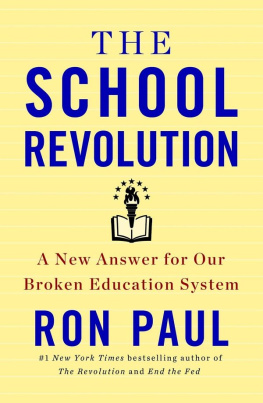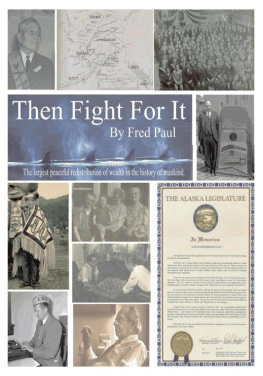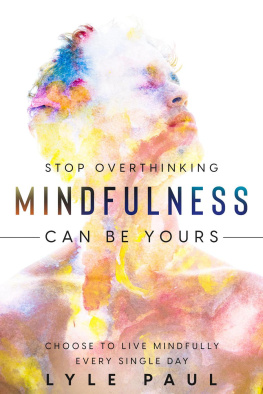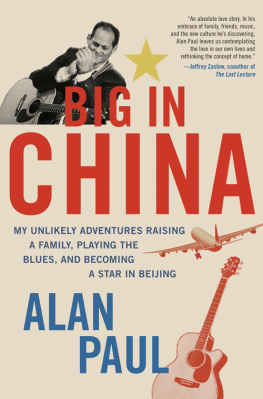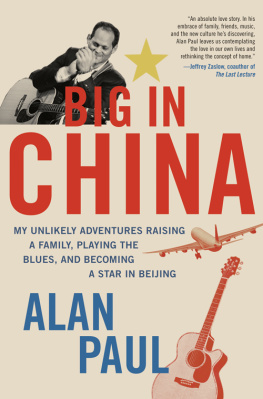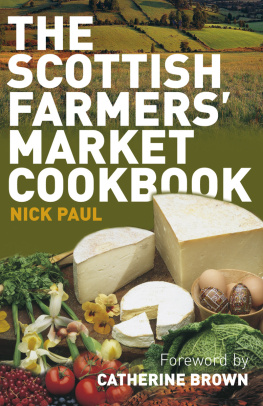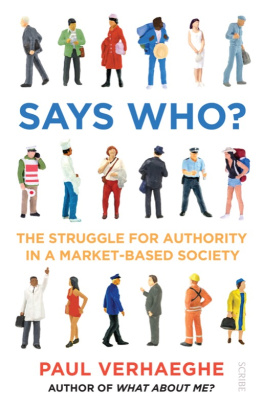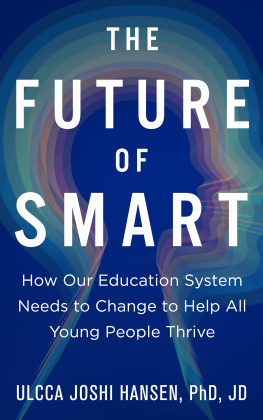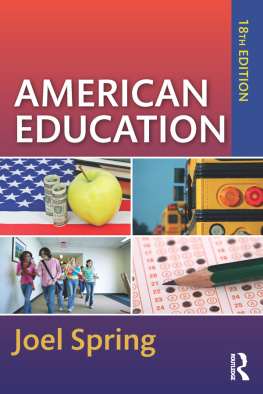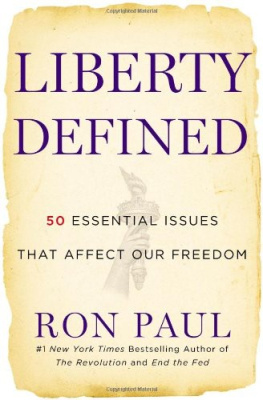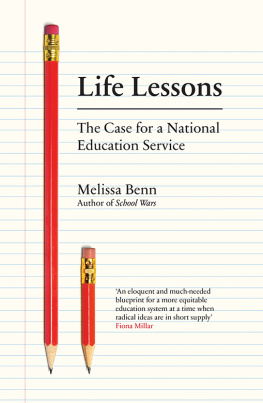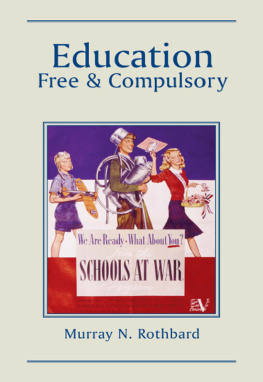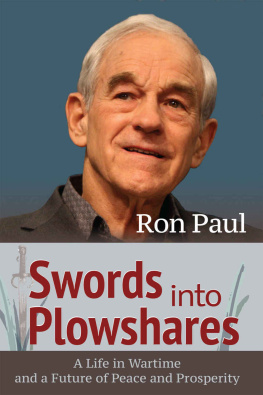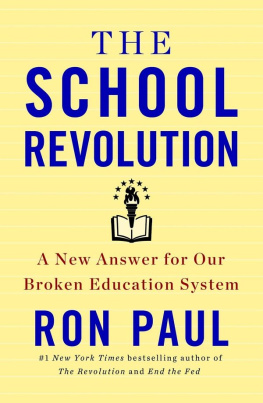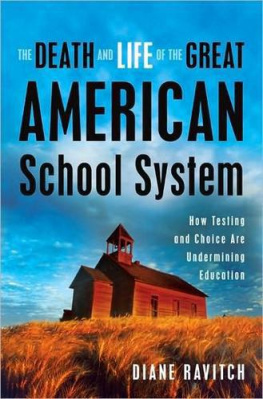I am a product of the public school system of a different time. Todays system cannot be compared to the public school I attended in the small town of Green Tree, just outside Pittsburgh, Pennsylvania.
The highest authority in managing my school came from our neighbors who served on the school board. It was a different era. I started in the first grade a few months before Pearl Harbor was bombed. It was the same school system that my dad, my aunts, and my uncles had attended.
There was nothing perfect about itas I remember, both educational and disciplinary policies came up shortbut compared to the average public schools in our cities and towns today, it was safe, drug-free, and with no dropouts.
Both in grade school and high school, I remember there were fights and roughhousing, but never once were the police called.
In twelve years of public education, I do not recall any classmate who came from a broken homenever heard of a friend with divorced parents. Possibly, this was a reflection of the time in which I lived.
One advantage we had then was the size of the school and classes. My eighth-grade class had twenty studentsmost of whom had been through the entire eight years together.
Each day the Bible was read, the Lords Prayer was said, and the Pledge of Allegiance was recited. No one objected, mainly because the school atmosphere reflected the values of the local community. The federal government was not yet endowed with the authority to keep us safe from ourselves. That came later to the schools throughout the country, as responsibility moved from local schools to huge school districts, state-government controls, and finally the intrusions of the federal courts and federal bureaucrats. None of this existed back then.
The most aggressive bending of the rules I did was sneak out and skip recess or intermission or gym classa block of time with less supervision. I remember it clearly. Id have to throw my coat out the window and then walk past a few teachers monitoring the corridors (who might have asked me questions as to why I was wearing a coat). Obviously, supervision of ones coming and going wasnt overly strict. Then Id grab my bike and hurry home, get my newspapers delivered rapidly, and arrive back at school to fall into place for the next class. My motivation was to be able to stay after school for basketball practice and not have to worry about delivering my papers late in the evening.
While in high school, at the age of fourteen, I worked in the local drugstore at the handsome wage of thirty-five cents per hour. Looking back, I find it surprising that I sold and could buy cough medicine with codeine without a prescription or parental permission. I never saw one classmate abuse this dangerous drug. Sneaking a smoke was the big crime in which kids occasionally engaged.
In the summer, I worked for the school, painting, scrubbing, and cleaning. It was hard work, starting at 7:00 A.M., but I was paid more than the thirty-five cents an hour I got at the drugstore.
In grade school, math was my best subject. All twenty of us in class got the same assignment: a list of problems to do and have checked individually by the teacher. Once the given problems were completed, we were allowed to loaf. The sooner I finished, the longer I could loaf while waiting for everyone to catch up, all the while probably making noise and interrupting the others. It was a game for me, and it wasnt until much later that I realized it would have been better for the school to adapt the teaching scenario to each students abilitysomething now well understood in homeschooling. Progressing at ones own pace certainly makes sense.
Even for this small town, graduation from elementary school was a big deal, complete with gowns and a fancy ceremony.
High school required traveling a few miles to the neighboring town of Dormont, since our population couldnt support grades nine through twelve. This going next door for high school, an agreement between two towns, was nothing like the giant complexes we see today as a result of local communities losing control over their schools and putting thousands of kids under one roof.
High school, in a similar fashion to grade school, had both good and bad teachers, but compared to today, the atmosphere was rather sedate. I witnessed some drinking, but I never saw any drug use nor was aware of any. Having witnessed a few classmates overindulging in alcohol made me respectand, in a way, fearthe ill effects of alcohol, and it was for that reason that I didnt touch it in high school or college. This early experience was one of the reasons alcohol had no significant attraction for me. Besides, I never did feel the need to do something just because others were doing it. I enjoyed being different, especially if it made sense to me.
Having a great biology teacher in high school guided me into the sciences in college. I give one particular teacher a lot of credit for my interest in biology and for my eventually getting into the premed program at Gettysburg College.
Running track was a huge event for me in high school, but also a great challenge, since some major knee injuries interfered with my athletic potential. Surgery back then was frequently more damaging than the original injuries. There was no arthroscopic or noninvasive surgery available. My options in track became limited, but later on I found other races to run.
Today, it may not be races to run, but there are plenty of policies to push. This has been a great substitute for me throughout my life.
It was in high school where I met my wife, Carol, who was one grade behind me. She claims she got to know about me was when she was in eighth grade, and watched me run as a freshman in high school. Our first date was on her birthday, when she was sixteen, on February 29, 1952. She chased me, and I finally caught her. We were married five years later, during my last year at Gettysburg.
My high school graduating class had 100 students. For me, small classes seemed always to be best. There were 325 in my class at Gettysburg, and my Duke medical school class was just under 100.
In my early years at Gettysburg, I was undecided about my future. Since I was influenced by my high school biology teacher, I took biology my freshman year because it was a requirement to have taken a science course to earn a BS degree. That was a lucky break for me, as it turned out.
Early on, I thought about teaching biology and about coaching. This led me to start working on a teachers certificate, since I would need a minor in education. That did not go well. The courses did not make a lot of sense to mebiology did.
In 1956 our education professor, head of the department, was gone for a few days on a trip to Washington, DC, to participate in an important discussion regarding new programs of funding for education. He explained before he left that he was going on the trip with skepticism about government control over funding, but on his return, he told the class that the government had no intention of attaching any strings to funding, and would not interfere with the countrys educational process. Washington would be able to help but would never take control. Though I was not political at the time, I recall wondering if that would be the case. The professor was dreaming; my instincts were correct.
Today, one thing is for certain: You cannot compare public education in a small town over fifty years ago to whats happening in these gigantic schools in todays cities, dominated by federal government and federal courts and thousands of bureaucrats and controls and regulationsits a totally different world.
Ive had several members of my family teach in public schools, and some are still involved. Our five children went through the public school system. But with each passing year, it becomes more difficult for me to remain complacent about the opportunities for young children now going to school. Other options ought to be made available to themall of them. That is why I wrote this book.

